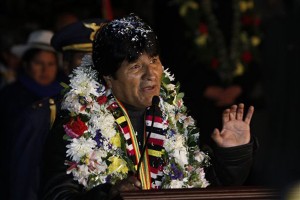
Bolivia’s President Evo Morales speaks upon his arrival home after an unplanned 14-hour layover in Vienna, at the airport in El Alto, Bolivia, Wednesday, July 3, 2013. The European rerouting of the Bolivian presidential plane over suspicions that National Security Agency leaker Edward Snowden was aboard ignited outrage Wednesday among Latin American leaders who called it a stunning violation of national sovereignty and disrespect for the region. AP/Juan Karita
LA PAZ, Bolivia — Bolivian President Evo Morales called the rerouting of his plane over suspicions that National Security Agency leaker Edward Snowden was aboard, a provocation to Latin America and urged European countries to “free themselves” from the United States.
His presidential plane arrived home in Bolivia’s capital late Wednesday night local time following an unplanned 14-hour layover in Vienna. His government said France, Spain and Portugal all refused to let it through their airspace, forcing it to land in Austria. He had been flying home from a summit in Russia.
Bolivian government officials have repeatedly said they believe that Washington was behind the incident.
“It is an open provocation to the continent, not only to the president; they use the agent of North American imperialism to scare us and intimidate us,” Morales said to about 100 supporters gathered at the La Paz airport to greet him.
Morales, a leftist, has long been a fierce critic of U.S. policy toward Latin America and had suggested while in Russia that he was be willing to consider giving Snowden asylum in Bolivia.
“I regret this, but I want to say that some European countries should free themselves from North American imperialism,” he said.
Ecuadorean Foreign Minister Ricardo Patino said that the presidents of Argentina, Venezuela, Peru, Ecuador, Bolivia, Suriname and possibly Uruguay will attend meeting in Cochabamba, Bolivia, on Thursday to discuss the matter. Bolivia said earlier it also would summon the French and Italian ambassadors and the Portuguese consul to demand explanations.
However it’s still unclear whether European countries did block the plane and, if so, why. French, Spanish and Portuguese officials have all said the plane was allowed to cross their territory.
The emergency stop in Austria may have been caused by a dispute over where the plane could refuel and whether European authorities could inspect it for signs of Snowden.
The U.S. declined to comment on whether it was involved in any decision to close European airspace, saying only that “US officials have been in touch with a broad range of countries over the course of the last 10 days,” about the Snowden case.
“The message has been communicated both publicly and privately,” State Department spokeswoman Jen Psaki said Wednesday. “He should be returned to the United States.”
Snowden himself remains out of public view, believed to be stuck in a Moscow airport transit area, seeking asylum from one of more than a dozen countries.